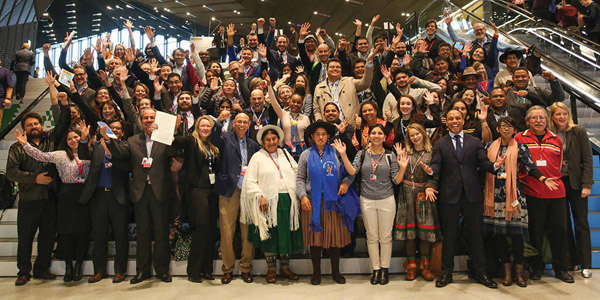With assistance from the Canadian government, an international forum for indigenous peoples around the world became an official platform under the United Nations Framework Convention on Climate Change (UNFCC), at the 24th Conference of the Parties concluded last December in Katowice, Poland.
 “Family photo” of the Local Communities and Indigenous Peoples’ Platform, COP 24 in Katowice, Poland. Photo by IISD/Kiara Worth (enb.iisd.org/climate/cop24/enb/7dec.html)
The Local Communities and Indigenous Peoples Platform is designed as a bridge between the UNFCC and indigenous/traditional communities through the Subsidiary Body of Scientific and Technological Advice. First mandated by the Paris Agreement (COP 21), the Platform provides an opening for traditional knowledge to influence climate policy at local, regional and international levels.
“Family photo” of the Local Communities and Indigenous Peoples’ Platform, COP 24 in Katowice, Poland. Photo by IISD/Kiara Worth (enb.iisd.org/climate/cop24/enb/7dec.html)
The Local Communities and Indigenous Peoples Platform is designed as a bridge between the UNFCC and indigenous/traditional communities through the Subsidiary Body of Scientific and Technological Advice. First mandated by the Paris Agreement (COP 21), the Platform provides an opening for traditional knowledge to influence climate policy at local, regional and international levels.
At the conference federal Minister of Environment and Climate Change Catherine McKenna announced funding for the creation of an Indigenous Peoples Focal Point, a specially appointed delegate, to promote global Indigenous knowledge on climate change. The new position is the first of its kind and will be supported through an $800,000 investment by Canada over four years. The Focal Point will coordinate and lead work on issues related to Indigenous Peoples and climate change, promote awareness of Indigenous perspectives on climate change, and serve as a technical expert and advisor.
Samantha Bayard, Spokesperson, Environment and Climate Change Canada, explains the position as follows: “The Indigenous Peoples Focal Point is the title for a dedicated position (i.e. employee) within the United Nations Framework Convention on Climate Change (UNFCCC) Secretariat, for which Canada’s funding will be used to establish and support. This is not a position within the Government of Canada, nor is the Government of Canada responsible for the hiring. The Government is Canada is providing funding support for the UNFCCC to staff the position and ensure an appropriate individual is in place to fulfill the role of the ‘Focal Point’.
“This position is the first of its kind within the UNFCCC and will act as a point of contact, technical expert and advisor to promote awareness and coordinate and lead work on issues related to Indigenous peoples and climate change. The Focal Point will support the Local Communities and Indigenous Peoples’ Platform at the UNFCCC, whose implementation was significantly advanced at the recent COP24 meeting in Katowice.”
“We need to recognize the valuable knowledge Indigenous Peoples have in understanding the environment and tackling climate change,” said Catherine McKenna. “Indigenous Peoples have been observing climate for millennia. Their leadership, resiliency, and knowledge will be great assets to the United Nations Framework Convention on Climate Change in tackling climate change and protecting our communities.”
